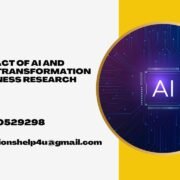Latest IT Thesis Topics for PhD in India
Latest IT Thesis Topics for PhD in India
Latest IT Thesis Topics for PhD in India. As India positions itself as a global leader in information technology (IT) and digital innovation, the landscape for PhD research in IT has never been more dynamic. Emerging technologies, government initiatives like Digital India, and the rapid pace of digital transformation across industries create vast opportunities for doctoral scholars. PhD candidates in India must now explore topics that are not only technologically advanced but also socially impactful, secure, scalable, and sustainable.
This article presents a comprehensive list of the latest IT thesis topics for PhD in India, carefully selected to align with current research trends, industrial relevance, and future prospects.
Artificial Intelligence and Machine Learning
1. Explainable Artificial Intelligence (XAI) for Critical Decision-Making Systems
Explore the use of transparent and interpretable AI models in domains like healthcare, finance, or law where trust and accountability are essential.
2. Federated Learning for Privacy-Preserving Machine Learning in Indian Enterprises
Research decentralized learning systems that maintain data privacy while training collaborative AI models across organizations, banks, or hospitals.
3. Ethical AI: Designing Bias-Free Algorithms for Indian Social Platforms
Investigate algorithmic fairness and strategies to mitigate racial, gender, and regional bias in AI systems deployed in Indian social or e-governance platforms.
Cybersecurity and Digital Forensics
4. Cybersecurity Threat Intelligence Using Deep Learning in Indian Financial Institutions
Develop threat detection models using deep learning to identify patterns in phishing, ransomware, and fraud in banking and fintech systems.
5. Blockchain-Based Identity Management Systems for Securing Indian Citizen Data
Evaluate blockchain frameworks for developing tamper-proof digital ID systems to protect Aadhaar and other sensitive databases from breaches.
6. Digital Forensics in India: Enhancing Evidence Collection from Cloud and IoT Devices
Design forensic models for tracking cybercrimes, digital fraud, and online harassment using advanced data provenance and logging systems.
Cloud Computing and Edge Technologies
7. Serverless Computing in the Indian Enterprise Context: Performance and Cost Optimization
Assess the adoption of Function-as-a-Service (FaaS) for handling unpredictable workloads, especially in e-commerce and logistics sectors.
8. Edge Computing for Real-Time Analytics in Smart Cities
Develop low-latency, edge-based systems to handle real-time data from traffic systems, surveillance cameras, and pollution sensors in Indian urban settings.
9. Cloud-Native Application Design for Government Services in India
Study architecture patterns for building secure, resilient, and scalable government apps (e.g., Digilocker, CoWIN) on cloud-native platforms.
Data Science and Big Data Analytics
10. Big Data Analytics for Public Policy and Governance in India
Explore how predictive analytics can assist in resource allocation, healthcare planning, and agricultural policymaking using vast public datasets.
11. Sentiment Analysis on Regional Languages for Indian Social Media Platforms
Build multilingual NLP models to analyze sentiments, misinformation, or election trends from platforms like Twitter India, Koo, and WhatsApp.
12. Real-Time Analytics Models for Indian Stock Markets Using Apache Kafka and Spark
Design real-time stream processing pipelines for making investment decisions, fraud detection, or portfolio optimization.
Internet of Things (IoT) and Smart Systems
13. IoT Framework for Smart Agriculture in Rural India
Develop IoT-based precision farming systems using soil sensors, irrigation controllers, and weather forecasts tailored to Indian agro-climatic zones.
14. Intelligent Home Automation Systems for Energy Efficiency in Urban India
Design smart home ecosystems that adapt energy usage based on occupancy, weather, and utility rates using edge-AI and IoT sensors.
15. Secure IoT Communication Protocols for Industrial Automation in India
Study lightweight, end-to-end encryption models for safe transmission in factory automation, particularly in Industry 4.0 environments.
Human-Computer Interaction and UX Design
16. Inclusive UX Design for Mobile Apps in Vernacular Indian Languages
Create multi-lingual mobile interfaces to enhance accessibility among non-English speakers in India for apps in banking, education, and healthcare.
17. Brain-Computer Interfaces (BCIs) for Assistive Technologies in Indian Disability Context
Research the use of non-invasive BCIs to enable communication and mobility for differently-abled individuals in Indian rehabilitation centers.
18. Gamification in E-Learning Platforms: Improving Retention in Indian Higher Education
Study the impact of game elements in learning apps and LMS platforms on student engagement and academic outcomes.
Quantum Computing and Future Technologies
19. Quantum Cryptography for Securing Indian Defence Communication Channels
Investigate quantum key distribution (QKD) techniques suitable for securing high-stake defense or intelligence communications.
20. Simulation and Modeling of Quantum Algorithms Using Classical Systems in India
Design and simulate quantum algorithms for optimization, searching, or factorization to prepare Indian institutions for the post-quantum era.
Blockchain and Decentralized Applications
21. Blockchain for Transparent Supply Chain Management in Indian Agri-Produce Markets
Build decentralized ledgers to track farm-to-fork traceability, pricing transparency, and reduction of middlemen in APMC markets.
22. Smart Contracts for Legal Automation in Indian Judiciary System
Explore how blockchain-based smart contracts can automate simple legal processes like property registration, affidavits, or licensing.
Digital Health and Bioinformatics
23. AI-Based Diagnostic Systems for Rural Healthcare in India
Design low-cost, AI-driven tools for detecting diseases like TB, diabetes, or skin conditions using minimal infrastructure.
24. Health Informatics Systems for Pandemic Surveillance in Indian States
Create integrated data platforms that track infection trends, hospital load, and vaccination metrics using spatial analytics.
Educational Technology and Digital Inclusion
25. Adaptive Learning Platforms Using AI for Indian School Curriculums
Develop AI-enabled tools that tailor learning pace and content based on student performance in rural and urban schools.
26. Bridging the Digital Divide: ICT Solutions for Tribal and Remote Indian Regions
Study the effectiveness of mobile-based, solar-powered education tools in enhancing digital literacy among underserved populations.
Robotic Process Automation (RPA) and Enterprise Automation
27. Enterprise-Level RPA Implementation in Indian BFSI Sector
Assess the impact of bot deployment on cost savings, employee productivity, and compliance in banking, insurance, and stock trading.
28. Intelligent Document Processing in Indian Government Workflows
Explore AI + RPA integrations to automate document scanning, indexing, and data extraction in ministries and public sector units.
IT Governance and Digital Transformation
29. Digital Transformation Strategy for Public Sector Undertakings (PSUs) in India
Examine frameworks and case studies of PSUs implementing AI, cloud, and ERP modernization for improved citizen service delivery.
30. IT Governance Models for Ensuring Data Sovereignty in Indian Enterprises
Research compliance frameworks (e.g., DPDP Act, GDPR) for Indian companies handling cross-border digital data.
Conclusion: PhD Research in IT for India’s Digital Future
India’s rapidly evolving digital ecosystem provides limitless opportunities for cutting-edge PhD research in IT. Whether it’s securing digital infrastructure, enabling smart governance, or building inclusive technology, the above topics reflect areas where scholars can make significant contributions. Choosing a thesis that merges technical depth with social impact ensures both academic excellence and real-world relevance.
Thank you for read our blog “Latest IT Thesis Topics for PhD in India”.
I hope this blog is helpful to you, if you have any question feel free Call / WhatsApp: +91.9830529298 || Email: dissertationshelp4u@gmail.com
Also read our more BLOG here.






